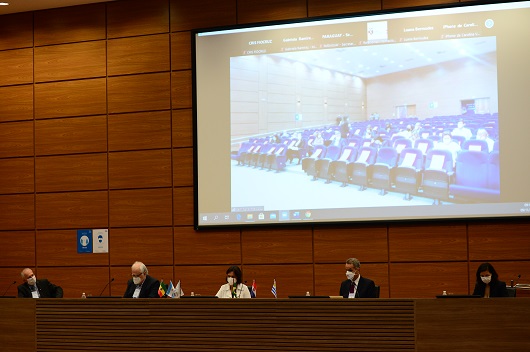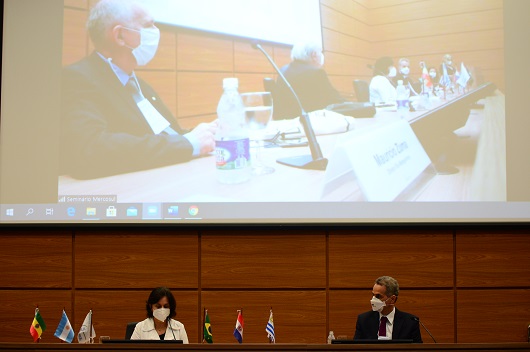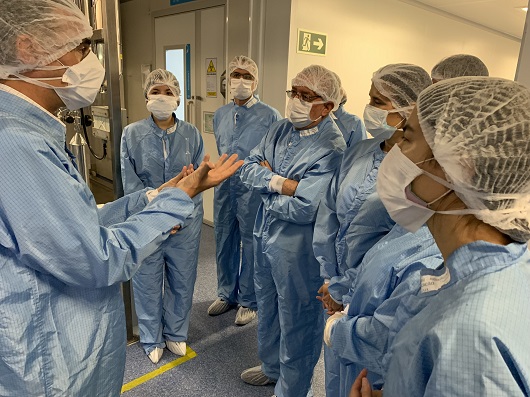Mercosur seminar hosted by Fiocruz will forward proposals on vaccine to Health Ministers
06/12/2021
Cristina Azevedo (Fiocruz News Agency)
The search for a coordinated solution to a common problem brought together representatives from Brazil, Argentina, Paraguay, Uruguay, and Bolivia this Tuesday (9/11) in the auditorium of the Immunobiological Technology Institute (Bio-Manguinhos). Organized by the Presidency Pro Tempore of Brazil in Mercosur, the Technical Seminar on Access to COVID-19 Vaccines: National Strategies and Possibilities of Expansion of the Regional Productive Capacity brought the sharing of experiences and challenges. The proposals that emerged in the debate - such as the suggestion of mapping the capacities and needs of the countries in the bloc - will be forwarded to the Health ministers in the region, who will meet on the 19th in Foz de Iguaçu, Paraná.
Seminar brought together representatives from Brazil, Argentina, Paraguay, Uruguay, and Bolivia (Photo: Peter Ilicciev)
The experiences reported were diverse, but the difficulties were often the same. Brazil made use of public institutions, such as Fiocruz and Butantan, in the search for vaccines, Argentina bet on a public-private consortium, while Paraguay and Uruguay faced the delay in the arrival of vaccines.
“Sixty-five percent of the doses already distributed in Brazil were manufactured in the national territory, by Fiocruz and Butantan”, observed minister Marcelo Queiroga, in a video, when welcoming the participants. "We have supported discussions to increase access to vaccines, and Mercosur is the place par excellence for this debate."
Face-to-face event
The seminar was organized by the International Health Affairs Office (Aisa/Ministry of Health), Ministry of Foreign Affairs, Fiocruz Global Health Center (Cris), and Bio-Manguinhos. Ambassador Michel Arslanian, director of the Department of Mercosur and Regional Integration at Itamaraty, highlighted that the bloc should not be restricted to trade issues. The Pro Tempore Presidency of Brazil chose the post-pandemic recovery as a cross-sectional theme, he said, "but for that, it is necessary to succeed in our vaccination efforts and to strengthen our capacities to face possible health emergencies." Marina Pittella, head of Aisa, in turn, emphasized the need to think of joint strategies for the region.
The president of Fiocruz, Nísia Trindade Lima, celebrated the fact that the drop in the number of cases of COVID-19 allowed the seminar to be largely face-to-face, but with a reduced number in the auditorium. Nísia recalled that countries' recovery times are different, because they are associated with vaccination capacity, and that it will be a long challenge to reduce the effects of the pandemic. She also recalled the choice of Fiocruz, together with an Argentine institute, as a regional hub for the development of COVID-19 vaccines based on messenger RNA. “These are Fiocruz's contributions that add to others. No institution will be able to provide effective responses to this serious situation alone”, she declared.
"No institution will be able to provide effective responses to this serious situation alone", said Nisia (Photo: Peter Ilicciev)
Rodrigo Cruz, executive secretary of the Ministry of Health, said that the country has adopted a diversified strategy in the acquisition of vaccines, both with technological orders - mentioning the technology agreement transfer from AstraZeneca to Fiocruz that will allow the production of the Active Pharmaceutical Ingredient (API) - and the purchase of ready doses. Although there is still no certainty regarding the need for revaccination, Cruz foresees that Brazil will turn the year with a balance of 130 million doses. For 2022, it is expected the supply of 120 million doses by Fiocruz/AstraZeneca and 100 million by Pfizer. This would allow the vaccination of all Brazilians between 18 and 60 years old with one dose next year, and those over 60 years old with two doses. “If it is also proven the need for revaccination of the group between 12 and 18 years old, we will have enough doses”, he said.
Changes in legislation
In the Argentine case, Pascual Fidelio, director of the National Administration of Laboratories, explained that it was necessary to create a law so the vaccines were purchased. Furthermore, was established an agreement between the public and private sectors for the development and production of vaccines. Cíntia Hernandez, director for the Generation of New Companies in the Knowledge Economy, said that policies were needed to strengthen the productive sector, with tax benefits for companies, such as the conversion of 50% of expenses into tax credit bonus.
Other countries also needed specific laws, such as Bolivia and Paraguay. Furthermore, Maria Antonieta Gamarra de Velázquez of the National Direction of the National Sanitary Surveillance recalled that Paraguay also needed a great logistical effort.
In Bolivia, the change in legislation allowed the purchase of vaccines by departments (states). Max Francisco Enriquez Nava, director of the Vaccination Plan, said that vaccination has reached 64.5% of the population with the first dose, and 54.6% with two, "but that has stagnated." The strategy that the country is now looking for is to go “from home to home”.
Uruguayan epidemiologist Graciela Pérez Sartori, of the Vaccination Unit of the Ministry of Public Health, said her country used bilateral agreements with vaccine producers to purchase vaccines, and cited difficulties in distributing them and special syringes.
A different map
On the Brazilian side, Dimas Covas, president of the Butantan Institute, and Maurício Zuma, director of Bio-Manguinhos, emphasized that it is necessary to know the needs and capabilities of neighboring countries, in what would be an initial step to establish partnerships and leave the region less dependent on North America, Europe and Asia in this sector.
Covas recalled that the pandemic showed the fragility of the region in relation to vaccines. "I'm not just talking about COVID. Most of the vaccines we use are not fully produced here." He recalled that the agreement that resulted in the production of Coronavac began even before the pandemic, with contact with Sinovac, which had already a vaccine against Sars. With the emergence of Sars-CoV-2, the vaccine was adapted, and an agreement was made for the development of phase 3 of the study in Brazil.
Participants visited Bio-Manguinhos' plant (Photo: Peter Ilicciev)
Zuma told the experience of Bio-Manguinhos not only against Coronavirus, recalling that the institute exports yellow fever vaccine to 75 countries through the United Nations. The choice of partnership with AstraZeneca has allowed to bring in a new technology. "Latin America has stopped investing in its laboratories. I remember meetings years ago in which countries like Venezuela, Peru, all produced vaccines. Today the production of many of them is impaired," he said.
For Sotiris Missailidis, vice director of Technological Development of Bio-Manguinhos, Fiocruz's performance from basic research to development, production, public health care and innovation makes it more open to promote partnerships – something that may happen in the future in relation to the mRNA vaccine. “Messenger RNA may be used not only against COVID-19, but for the development of vaccines in less space and costs for other respiratory viruses without depending on the North.”
Next steps
James Fitzgerald, head of the Department of Services and Systems in Health of the Pan-American Health Organization (PAHO), emphasized improvement in the situation of Latin American, which has already been considered the epicenter of the pandemic. But the region faces challenges, such as difficulties to get inputs and development of capacity. “We need an integrated focus and cooperation between the countries, put innovation at the service of health. A multisectoral coordination is essential”, he said. “We hope that Mercosur participates actively.”
Finally, Paulo Buss, director of the Fiocruz Global Health Center (Cris/Fiocruz), proposed the creation of a working group in health within Mercosur, supported by specialists, to discuss the proposals that emerged in the seminar and prepare suggestions of actions to be taken to the ministers. “This theme cannot be forgotten. And Mercosur needs concrete results”, he concluded.




